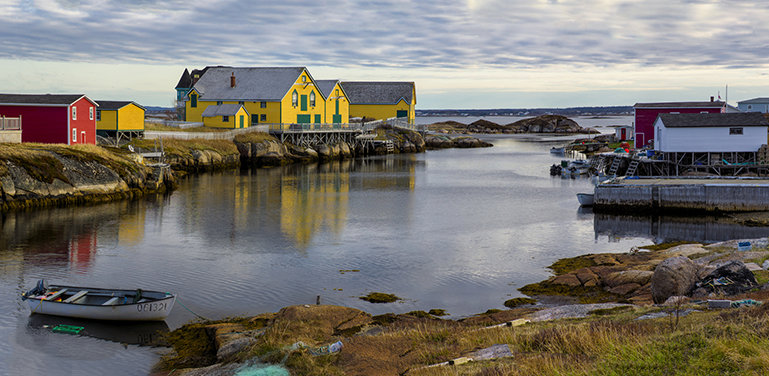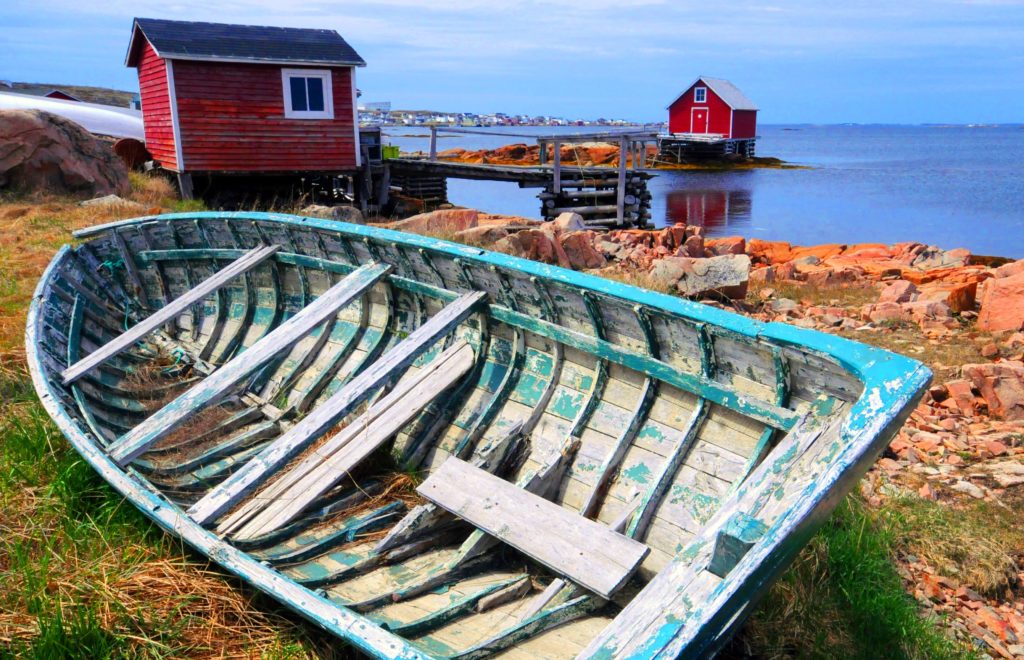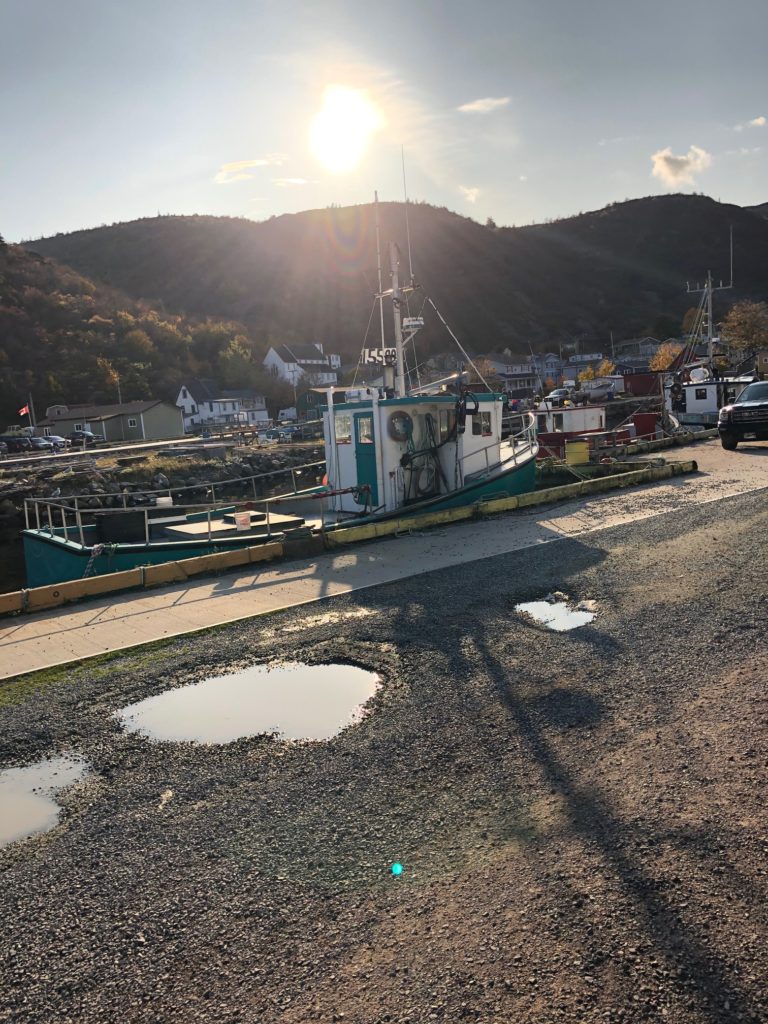Written by Nicole Helwig, manager of the Centre for Social Enterprise at Memorial University of Newfoundland.

Newfoundland and Labrador, Canada is a place marked by rugged landscapes and the harsh weather of the North Atlantic. For centuries, people have survived against the elements in small coastal communities and in the North. These rural and remote communities are the source of many fascinating historical and contemporary examples of organising for social change and provide the backdrop and the inspiration for the work of the Centre for Social Enterprise (CSE).
Historical background

With the arrival of the Europeans beginning in the late 15th century, the cod fishery became a significant activity with fishing fleets from England, France, Spain and Portugal developing offshore and inshore fisheries. Over the centuries, settlements became established with local fisheries occurring alongside European migratory fisheries.
During the 1800s, a truck system[1] developed in outport communities whereby merchants provided food and supplies to fishermen on credit laying down conditions for exploitation. In reaction to these conditions, we see the emergence of a co-operative movement with the first Grenfell co-operative founded in Red Bay, Labrador in 1896. Dr. Wilfred Grenfell, an English doctor who had travelled to the area to provide healthcare brought not only his medical expertise, but his knowledge of how co-operatives worked. Further south on the island of Newfoundland, William Coaker led the formation of the Fishermen’s Protective Union (FPU) to counter the power of the merchants[2]. The FPU established a political voice along with alternate marketing channels in the hands of the FPU members. Impressively, through Coaker’s influence the construction of the only union town in North America began in 1916. Port Union became the site of the Union Trade Company and its related enterprises.
Decline of the fisheries
The twentieth century marked a period of decline that ultimately led to the collapse of the cod fishery due to overfishing. Our economy had to shift dramatically due to a cod moratorium in 1992 that eliminated nearly 40,000 fishery-related jobs overnight[3]. Additionally, we note that globally the trend is towards urbanisation. We see this in Newfoundland and Labrador too through rural population decline due to youth outmigration, a phenomenon exacerbated in combination with aging population demographics. Still, we have isolated communities that continue to fight for survival.

Through our engagement with partners of CSE, we see communities taking ownership of local assets and organising to survive. For example, there is Battle Harbour, Labrador. Once an important summer station for the Labrador fisheries and an unofficial capital, it is now a national historic site which provides seasonal work for members of three communities[4]. A tiny island in the Labrador Sea, its value lies in the twenty-odd buildings which were restored by community members to preserve the traditional built heritage of the outport fishery. Community members return to the site in the summer to bring the place to life for tourists who experience how people lived and worked there hundreds of years ago.
Then there’s St. Mary’s Bay Connect, a non-profit social enterprise that was created so that four communities could come together in a private-public-community project to bring cellular service to the region[5]. Without cell coverage, community members determined that the area’s opportunities for economic activity are severely limited. The cell tower which is being erected in 2020 will be owned and managed by those communities.
And there’s also the St. Jacques Island Heritage Corporation which is developing activities around a decommissioned lighthouse[6]. There is example after example of communities organising around built and other assets to capture economic value for local impact.
Social enterprise for social change
The above cases illustrate communities reorganising in the wake of changed economic circumstances and relying heavily on the principles of community economic development. At the CSE we speak of social enterprise as a pathway to social innovation. In our context, this is reflected by the many smaller instances of social organising which collectively demonstrate an alternative to typical economic development. I’d like to share a final example, one that seeks to turn entrenched south-north relationships on their head and can be seen as reconciliation in action.

The province is marked by colonialism in its very name and the colonial legacy cannot be denied. SmartICE is a community-orientated organisation offering a climate change adaptation tool, designed to incorporate sea-ice monitoring data with local Indigenous knowledge of sea ice conditions, which can contribute to more informed decisions regarding safe land, water, and sea ice use[7]. It is also a social enterprise that has taken decisions that in conventional business terms would be dismissed as uneconomic. In particular, they have chosen to base their manufacturing facility in Nain, Labrador, a remote northern community of less than 1,200 inhabitants. It is also a community where over 90 percent is indigenous and the unemployment rate is approx. 30 percent. The impact of locating their operations in Nain along with additional steps that put control in the hands of community is potentially game changing.
Centre for Social Enterprise
The Centre for Social Enterprise (CSE) was established as the only centre in Newfoundland and Labrador focusing on social enterprise and with the potential to catalyse positive social and economic impact through the province’s only university. Since its official launch in 2017, the CSE has become established as a hub of expertise and activity on social enterprise with a wide network of collaborators and partners both in the province and beyond.
Our activities focus in large part on discovering social enterprise – what it was, what it is and what it looks like. Through my work as Manager of the CSE, I enjoy discussing with students the histories of the Grenfell co-operatives and the Union Trade Corporation. The names Grenfell and Coaker appear in their school books, but invariably the students are intrigued by their stories as told through the lens of addressing social challenges. We support students of any discipline to learn about social enterprise through hands on experience providing opportunities for them to see what communities in our province are doing to enact change.
Built on a partnership between Memorial University’s Faculty of Business Administration, School of Social Work and School of Music, we view social enterprise as business innovation that contrasts with the prevailing view of profit maximisation. For our communities to survive and thrive, profit is tempered with community benefit and by the creation of value for and by community. We also recognise the complementary nature of economic and social development and the importance of restorative justice if there is to be balance and sustainability in our communities.
By drawing connections between historical and contemporary examples, we resist the notion that social enterprise and social innovation are new phenomena and possibly, provide an alternative to current models built on unsustainable growth.
The Social Ideas Podcast: the rise of Newfoundland
In this episode of The Social Ideas Podcast, Nicole Helwig shares the importance of social enterprises in the Canadian province of Newfoundland and Labrador.
Twenty-five years after a cod fishing moratorium was put in place, the towns built around the fisheries continue to suffer the economic impact.
The economic and cultural importance of social enterprises in this part of the world cannot be under-estimated.
References
[1] Higgins, Jenny, 2007, The Truck System. Retrieved from <https://www.heritage.nf.ca/articles/economy/truck-system.php>
[2] Maritime History Archive, 2003-2012, Fishermen’s Union Trading Company. Retrieved from <https://www.mun.ca/mha/fpu/fpu19.php>
[3] Berry, D., Cod Moratorium of 1992 (2020). In The Canadian Encyclopedia. Retrieved from https://www.thecanadianencyclopedia.ca/en/article/cod-moratorium-of-1992
[4] Slade, G, 2020. Interview by Nicole Helwig.
[5] Hoddinnot, Samantha 2019, Creating a Connection to the Present. Retrieved from <https://www.mun.ca/socialenterprise/news.php?id=12946&type=features>
[6] Croft, Sarah, 2020 Preserving structures and memories in rural N.L. with student support. Retrieved from <https://www.mun.ca/socialenterprise/news.php?id=13711&type=features>
[7] C. Harding (personal communication, November 25, 2020) also notes more available on the SmarICE website <https://smartice.org/>


Fiire
Thanks for sharing informative information for us.
Centre for Entrepreneurship Development